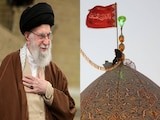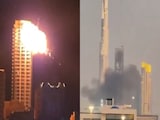- President Xi Jinping sent a secret letter to President Murmu testing India's stance on China relations
- The letter expressed concern over US-India agreements potentially harming Beijing's interests
- India and China agreed to accelerate talks to move beyond the 2020 border clash
When US President Donald Trump intensified his trade war with China earlier this year, Beijing began an outreach to India with a private letter from President Xi Jinping to President Droupadi Murmu, a Bloomberg report claims.
According to the report, which cited an unnamed Indian official as its source, Xi's letter was intended as a test of India's willingness to recalibrate ties with China. Although the letter was sent to President Murmu, the message was swiftly conveyed to Prime Minister Narendra Modi. In the note, President Xi expressed concern about any prospective US-India agreements that might harm Beijing's interests, the report claimed. The Chinese premier also named "a provincial official who would steer Beijing's efforts," the report stated.
It further added that PM Modi's government began taking the Chinese outreach seriously in June, amid its own talks with the United States over Trump's tariff threats and his claim that it was he who brokered a ceasefire between India and Pakistan following the sharp regional escalation over the Pahalgam terrorist attack in Jammu and Kashmir in which 26 people were killed.
Stung by Trump's tariffs, both India and China agreed to accelerate efforts to move beyond the 2020 border clash, pledging to renew talks over the long-standing boundary disputes, the report states.
Following these developments, there has been a marked improvement of India-China ties. Direct passenger flights between India and China are set to resume within weeks. Beijing has relaxed restrictions on urea shipments to India. New Delhi, for its part, has reopened tourist visas for Chinese nationals after years of suspension.
Ironically, the trigger for this renewed ties was Trump's tariff policy - intended to punish Beijing and, later, India. In March, just after he doubled tariffs on Chinese goods, China's foreign ministry called on Delhi to join in "opposing hegemonism and power politics." Xi himself declared that making the "elephant and dragon dance together is the only right choice."
By July, Chinese officials were repeating the metaphor. The Global Times, a state-backed newspaper, went further, calling for a "ballet dance" between the two Asian giants in resisting US tariffs.
PM Modi is likely to meet President Xi during his China tour later this week for the Shanghai Cooperation Organisation (SCO) summit. This will be the Prime Minister's first visit to China in more than seven years. The last time the two leaders shared a stage was at last year's BRICS summit in Russia's Kazan.
"Xi will want to use the summit as an opportunity to showcase what a post-American-led international order begins to look like and that all White House efforts since January to counter China, Iran, Russia, and now India have not had the intended effect," Eric Olander, editor-in-chief of The China-Global South Project, a research body, told news agency Reuters recently. "Just look at how much BRICS has rattled (US President) Donald Trump, which is precisely what these groups are designed to do."
This year's summit will be the largest since the SCO was founded in 2001.















